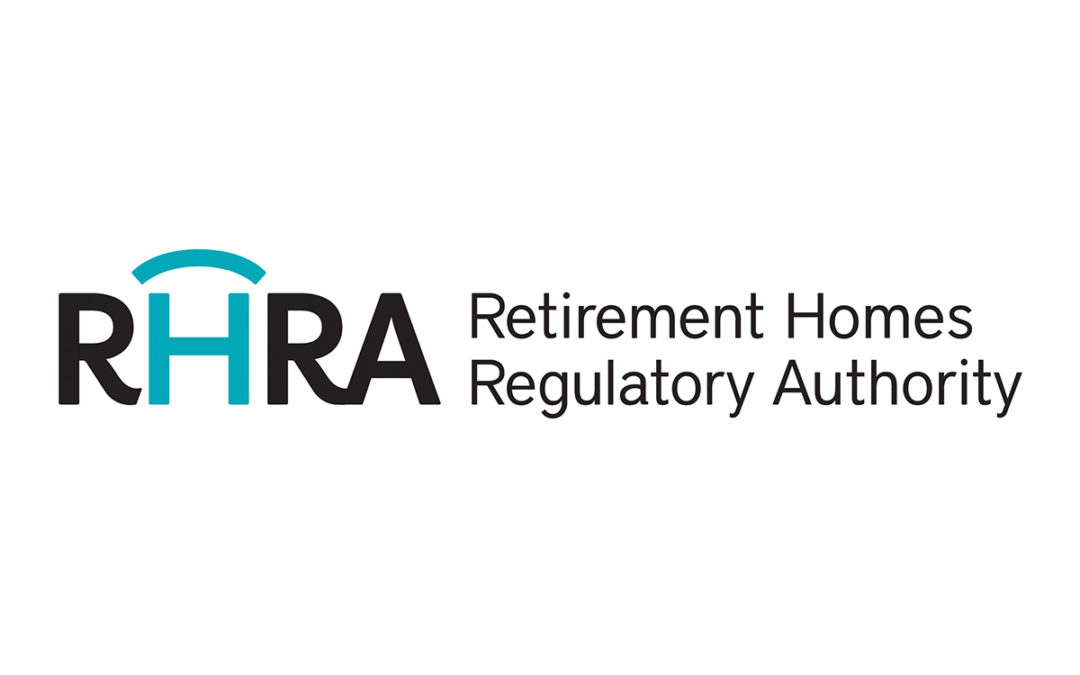Protecting Seniors’ Rights.
With so many retirement homes opening up across Ontario it’s fair to wonder who protects the seniors that are living in them. Retirement homes are a huge industry in Canada, housing thousands of seniors, employing thousands of people and bringing in millions of dollars in revenue every year. With such a large industry serving a vulnerable population who is in charge of making sure abuse, neglect and other incidents don’t happen? The answer is the Retirement Home Regulatory Authority (RHRA).
All Retirement Homes and Retirement Communities in Ontario must be licensed by this governing body who ensures the Retirement Home Act (2010) is being followed and respected. The Retirement Home Act was passed in to law in 2010 to make sure vulnerable seniors were not being taken advantage of and that retirement homes were held accountable to someone. With the implementation of the act, the RHRA was formed and inspectors were hired to ultimately police this.
Inspections are done on an ‘as-needed’ basis or every few years. All inspection reports and information regarding retirement homes are public knowledge and posted on the their website, at www.rhra.ca
What is a “Retirement Home”- In order to be licensed by the RHRA a home/ community must fit a certain criteria. This includes the following: it must have at least eight people living there that are not related and two or more care services must be provided. Care services include meals, PSW or nursing support and dispensing medication.
What is not a “Retirement Home”– Some buildings will open and label themselves as “Senior Living” or “Retirement Living”, and in fact they are facilities that cater to senior residents, but they do not have care services so they are not licensed. This does not mean these places are not governed by any rules, but they are not covered under the Retirement Home Act (2010).
Elder Abuse- Under the act, all retirement homes are obligated to report any suspected abuse whether it is by a resident, staff or family member. Reports of abuse are taken very seriously and acted on urgently. If a retirement home fails to report a suspected abuse they can lose their license.
Staff Training – One big thing that separates a ‘senior living’ establishment and a retirement home is the amount of staff that are on site and helping residents. Whether it is nursing staff, management, kitchen staff or dining room staff the RHRA has mandatory training that all staff must complete yearly. The RHRA puts no rules on staffing ratios or what type of staff have to be in the building, but does ensure that all staff are trained. As well, they ensure that the type of staff a retirement home states it has working there is in fact the type of staff in the building. For example, if a retirement home says they have a nurse on site 24 hours a day, they must ensure they do have a nurse on site 24 hours a day.
Complaints- If a senior is unhappy or a family member is not happy with the treatment of a resident at a retirement home they can submit a complaint to the RHRA that will be investigated. This ensures that retirement homes are being held accountable for their actions and that the consumer is being protected.
Price increases and moving out- Although the RHRA oversees many aspects of the Retirement Home, when it comes to rent increases and giving notice of termination the Retirement Home follows a separate act called the Residential Tenancy Act (2006).
Retirement homes are also different from Long Term Care Residences. Where Long Term Care is funded by the provincial government and follows the Long Term Care Homes Act (2007)., retirement homes are privately run with no regulations on the type of care they must provide, or how much they can charge for their services.
When working with a Senior Living Advisor, it’s important for them to have a good understanding of the Retirement Home Act (2010) as well as the Residential Tenancy Act (2006). Your counselor is helping you make informed decisions about the different retirement homes and a big part is knowing what your legal rights are as a tenant. It is also very important to do your research and know how well that residence is following the laws set in place by reading past inspections found online.
All Solva Senior Living counsellors have worked in retirement homes and are very familiar with the laws and regulations surrounding them. Our counselors ensure that clients understand their rights as a tenant and only recommend residences that are following the acts set in place.
Resources:
RHRA Website- www.rhra.ca
Retirement Home Act- https://www.ontario.ca/laws/statute/10r11
Residential Tenancy Act- https://www.ontario.ca/laws/statute/06r17
Long Term Care Homes Act- https://www.ontario.ca/laws/statute/07l08
How does this work?
Call us at 613-421-6073 or email info@solvaseniorliving.ca
We provide the following free services:
1- Rapid Resources & Referrals
2 – In Person Visits (offering phone calls or video chats currently as we respect social distancing)
3 – Arrange and Escort on Tours (again, offering virtual tours and presentations or residences can email out still photos, including specifics of accommodations)
4 – Advocacy during the selection and move in process.
5 – Resources for additional services
____________________________________

